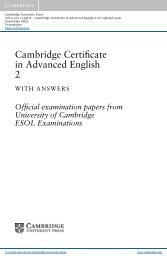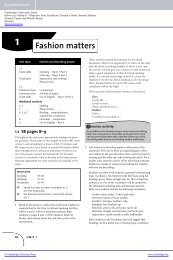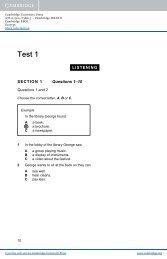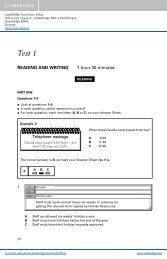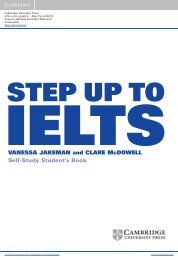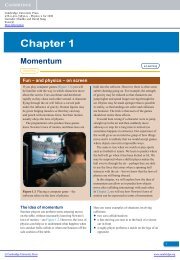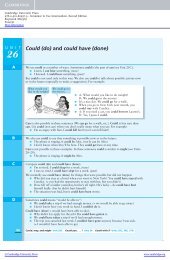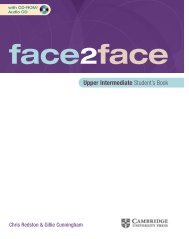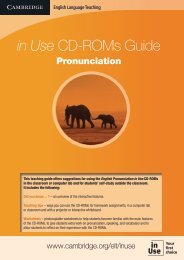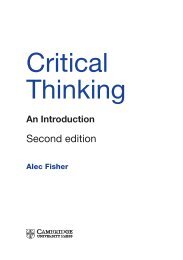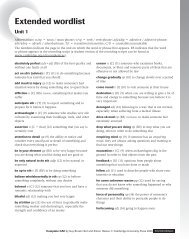Skills for Study Level 2 Teacher's Book - Cambridge University Press
Skills for Study Level 2 Teacher's Book - Cambridge University Press
Skills for Study Level 2 Teacher's Book - Cambridge University Press
You also want an ePaper? Increase the reach of your titles
YUMPU automatically turns print PDFs into web optimized ePapers that Google loves.
1dSuggested answersSummaries of each author’s position:Author 1The author is hostile to the idea of CAM, arguing that it is unscientific. Theauthor also maintains that claims that CAM enjoys widespread popularity arefalse, saying that the number of people using it is ‘tiny’. (This conflicts with thein<strong>for</strong>mation in all three sources: Sources A/C claim that approximately 47% ofEnglish citizens will use CAM at some point in their lives; Source B found thatabout 10% of its sample used CAM.)The author also claims that use in the UK is mainly in the 45–54 age group,based on the in<strong>for</strong>mation in Source B; however, this ignores the fact thatsimilar percentages are found in other age groups. There is no evidence <strong>for</strong> theauthor’s claim that people in that age group turn to CAM out of ‘desperation’.Author 2The author seems to accept the claim made in Source A that CAM enjoyswidespread popularity. However, they generalize from the evidence, which isbased mainly on statistics in England, to make less certain claims about theUK as a whole. Also, the author claims that because a wide variety of CAMtreatments are available in the UK, this means that the UK medical systemis one which “fairly balances both scientific, modern, medical therapies withnon-conventional approaches to treatment”, which is not supported by theevidence.1eSuggested answersStatement Agree DisagreeYou can be certain that what you read is correct if it iswritten by an expert.You should not automatically accept that claims aretrue just because they are supported by data.You cannot trust any data you read.You should not assume that your own conclusionsabout what data means are true.You should question where the data came from, whocollected it, and how it was gathered.✔✔✔✔✔1f Group discussion2 Dealing with sources of uncertainty2aSuggested answers• Claim may be based on research data <strong>for</strong> which the method is flawed.• Uncertainty may creep into a sound study if the number of observations(human sample size, number of measurements) is small.• There may be accidental misinterpretation of data when it is analyzed.• Claims made based on other people’s work are less certain becausethe original author may have used inconclusive data or it may containmisinterpretations.• There may be deliberate misrepresentation of in<strong>for</strong>mation by a source.Unit 3 Part C ∙ Investigating 87



